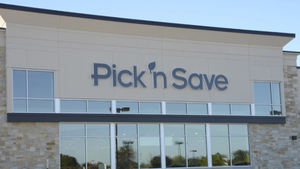ASIAN CRISIS ANALYZED BY GLOBAL RETAILERS
SINGAPORE -- The Asian economic crisis is creating hurdles and opportunities for major global retailers hoping to expand in this region.Executives from companies including French food retailer Carrefour; Ahold, Zaandam, Netherlands; and Hong Kong-based Dairy Farm told last week's annual congress of CIES: The Food Business Forum that they were in Asia to stay and expand.But these executives told the
June 15, 1998
JAMES DALLMEYER
SINGAPORE -- The Asian economic crisis is creating hurdles and opportunities for major global retailers hoping to expand in this region.
Executives from companies including French food retailer Carrefour; Ahold, Zaandam, Netherlands; and Hong Kong-based Dairy Farm told last week's annual congress of CIES: The Food Business Forum that they were in Asia to stay and expand.
But these executives told the 600 delegates gathered here that the economic crisis has had an effect on how they carry out their strategies. The economic realities have weakened local players and in some cases altered the pace of expansion for the global retailers.
Carrefour, with 39 stores in seven Asian countries at the end of 1997, plans to add another 19 stores around the region this year. However, Gerard Clerc, Carrefour's chief executive in Asia, told the congress the economic downturn would slow the group's development this year. For example, Clerc said Carrefour would open only one store instead of four in Thailand; four stores instead of five in South Korea; and one in Indonesia instead of two.
However, Clerc said the group was "fundamentally very confident. In reality, we have just started in Asia," he said. "Luckily, Taiwan has been largely spared and our stores in the other countries -- between one and three years old -- show results close to break-even." Clerc said Carrefour would continue to open four stores a year in Taiwan -- a market where Carrefour is easily the market leader with 18 stores, volume of $1 billion (U.S.) a year and profit of $23 million.
Carrefour now operates 324 hypermarkets in 16 countries worldwide, with sales last year of $30 billion. Most of Carrefour's volume is generated by its most established outlets in France, Spain, Brazil, Argentina and Taiwan.
Ron Floto, Dairy Farm Group executive officer, formerly head of Super Kmart in the United States, said he had concentrated on rationalizing the company's operations in his first 12 months, selling off or closing down businesses that did not fit the core business of retailing in the Asia Pacific region.
With the sale of such businesses as the Simago chain in Spain, Kwik Save in the United Kingdom, and a joint-venture share in a Nestle Dairy business in China, Dairy Farm is cashed up to the tune of about $200 million and is on the acquisition trail in Asia.
The company, which operates about 1,800 supermarkets, drug stores, convenience stores and restaurants in Asia and Australasia, recently purchased a 31% share in the Hero supermarket chain in Indonesia for $36 million -- a much lower price than it could have expected to pay before the economic crisis. "Our attention now will be centered on growth in our existing markets and geographic expansion within the region," Floto told delegates. But he warned that while the conventional wisdom seemed to be that the Asian economic crisis presented acquisition opportunities, he did not expect there would be many bargains.
"My view is that, generally, things are sold for about what they're worth, if not more. I think values will be robust given the very, very difficult conditions that will exist for years in most Asian markets," he said. "However, the good times [in Asia] were too good and gave rise to some quite obvious excesses, particularly in the area of speculative property development, no small part of which was retail."
Since arriving in Asia in 1996, Royal Ahold has never made any secret of the fact that it wanted to be either No. 1 or 2 in each of the markets it entered. In two short years, the Dutch supermarket chain has moved into five Asian countries, setting up joint-venture partnerships and opening more than 100 Tops stores.
Addressing the congress, Eddie Moerk, a member of Ahold's corporate executive board, said the company saw "acquisitions and rapid internal growth as the strategic building blocks to reaching the prominent positions we're looking for. We currently see several opportunities for further growth through acquisitions if the price is right and the deal meets our corporate conditions."
Moerk said Ahold was fortunate in that the strength of Ahold's joint-venture partners was essential for the success of its regional Tops banner.
"Our partners know the local scene, have the right contacts, are thoroughly familiar with local tastes, the culture and many ways of getting things done and generating the required results," he said.
Moerk said although sales in Tops stores around the region were up significantly, the considerably weakened local currencies painted another picture when sales were converted into the Dutch guilder. "As we are in investment mode and plow back total cash flow, plus more, from corporate level into the Asia operations, we can live with it," he said. "But I feel sorry for some of the local companies that suffer so much."
Ahold expects sales in Asia to reach $1.2 billion by the end of this year, and is currently predicting it will break even in the year 2000.
How can local operators survive given the invasion by global chains and the economic problems in the region? Many observers say only the strongest will survive. One strong local player is Singapore's NTUC Fairprice, whose chairman, Chandra Das, appeared as a panelist in the same session as Clerc, Moerk and Floto. Asked whether he thought the Asian retailing industry was about to be colonised, he replied that local retailers could survive -- provided they were given a "level playing field."
About the Author
You May Also Like




